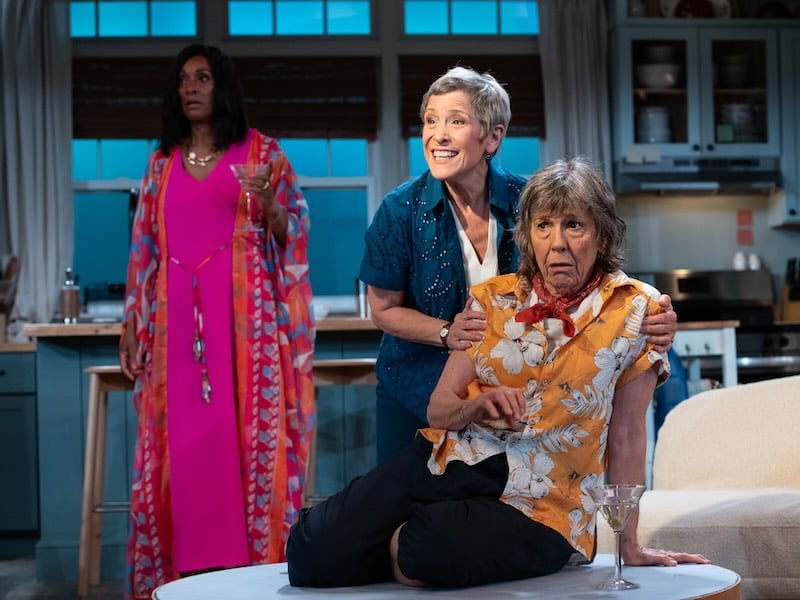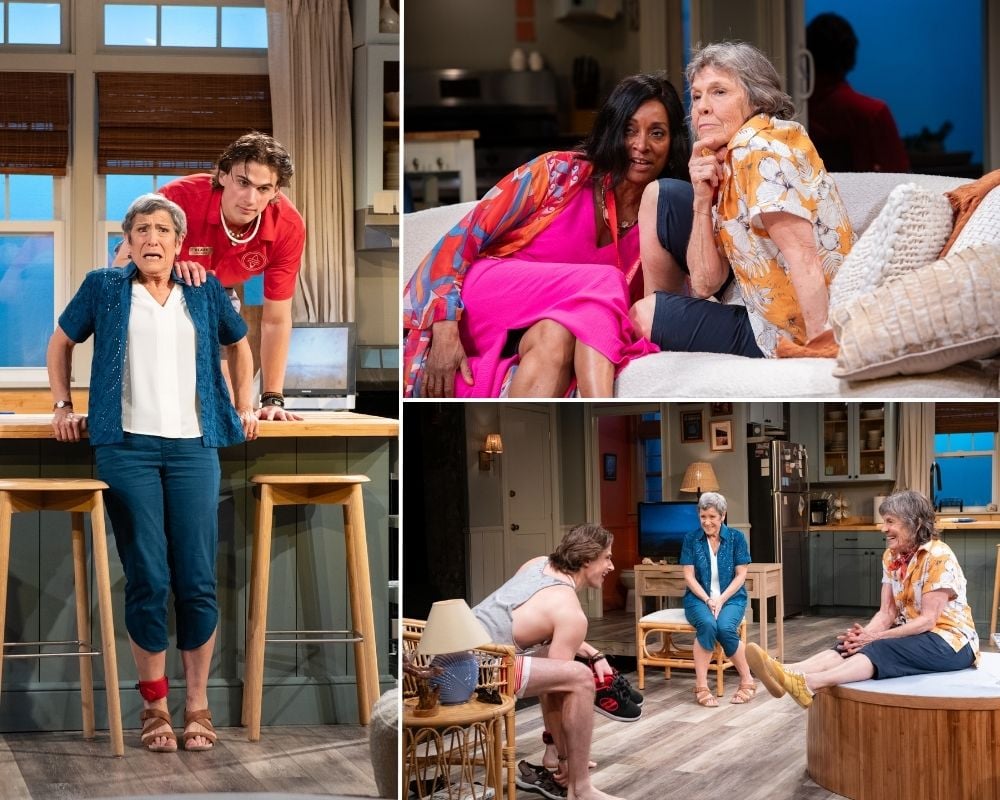The playwright Aurora Real de Asua, when asked by an interviewer to tell a bit about herself, replied, “I am a surfer, performer, and writer” — putting surfer first. As evidenced by the play she wrote called Wipeout (surferspeak for a wave-tossed tumble and plunge underwater), she knows a lot about the sport. So dedicated to surfing is she that her script sets the scene in the Pacific Ocean, where its four characters are afloat the entire time on foam surfboards, pretending to paddle through all their blocking and entrances and exits.
Absent a movie-set wave tank, it’s hard to picture how Wipeout’s aqueous locale might be persuasively represented in performance. Previous stagings have had actors skootching around on surfboards mounted on casters with seascape projections in the background. The play is one of a series of National New Play Network Rolling World Premieres, and the regional debut now at Studio Theatre is not like that at all. Here, Wipeout is directed with striking emotional depth by Danilo Gambini, whose production concept is utterly counterintuitive: There are no surfboards. No sea can be seen. The entire play takes place inside a beach house (tastefully designed by Jimmy Stubbs in shades of taupe and tan with furniture made of rattan).

I’ll admit I approached the matinee I saw with some doubt about whether Aurora Real de Asua’s surreally sea-set story would land on land. Much to my surprise, I left the theater having enjoyed overwhelmingly a hilarious and shattering show. Hilarious, because most of the play is laugh-out-loud funny (about which, more later). Shattering, because as the play’s metaphorical title portends, a person can suffer a catastrophic stroke of bad luck and falter and collapse.
It’s the people in de Asua’s play who make Studio’s production so compelling, not the improbability of its place. Three spunky women, best friends since high school and now of a certain age (late 60s to early 70s), have gathered to celebrate a birthday and take a surfing lesson — from a 19-year-old surfer dude. (Cue the cougar jokes.) The script has not been altered to reference or fit this House Beautiful setting. The characters banter, bicker, and pretend at surfing as if afloat at sea all the while indoors (a circular table centerstage platforms the most performative moves). Within minutes, we catch this aesthetic’s drift, becoming captivated by these three golden girls’ athletic antics, unsisterly sniping, and wrenching revelations. Gambini’s theatrical gamble pays off, creating a comedic mise-en-scène through uncanny collective suspension of disbelief.
What also makes this not-at-sea production concept work so remarkably well is that, as it turns out, the characters’ backstories and interpersonal tensions have the emotional relatability of drawing-room dramedy. Claudia, a contentedly married mother of two grown children, has invited her two best friends to this senior surfing session: Gary, an avid proponent of lesbianism, and Wynn, who is currently divorcing her fourth husband. A lot of snark attacks ensue.
Claudia is a teacher by profession, and Naomi Jacobson thoroughly embodies her welcoming and chipper officiousness and occasional timorousness. Sarcastically, the others think Claudia overstates her marital bliss:
CLAUDIA: Georgie and I love each other in a way that feels satisfying and supportive.
WYNN: You mean he still doesn’t know where your clitoris is?
CLAUDIA: Georgie is very tender towards me. We consider ourselves co-creators of the intimate space.
GARY: Hey, Wynn, know who’s seen more action than Claudia? The inside of my wetsuit.
[Wynn cracks up.]
Wynn, wearing wealth — a sophisticated caftan in contrast to Claudia’s and Gary’s casual beach wear (costumes are by Valérie Thérèse Bart) — has an air of cantankerous imperiousness that Delissa Reynolds totally delivers. Renegade Gary (birthname: Margaret), charging the stage like a wild child on uppers, is the die-hard devotee of the sport (“My whole life I wanted to be a surfer, ever since I was a little girl!,’’ she says more than once), and Katherine Cortez completely captures her complex character arc.

They’ve come together for the fun of it; they goof around like AARP-age adolescents. They vape, they tipple martinis, and like horny sorority sisters, they ogle and rate the butts of nearby guys and revel in references to body parts of all sorts.
WYNN: Are you still seeing that Pamela person?
GARY: Oh hell no. No, that pinto bean has left the taco… I’ve upgraded to a newer model… Her name is Anika…
CLAUDIA: She’s very kind.
GARY: And wait till you see the bazoombas that come with.
Count on Gary too for one-liners like “The best thing about being a lesbian is you don’t have to fake orgasms anymore.”
At one point early in the play, Gary tells a hilarious story about an encounter with a male high school classmate everyone knew. It ends with all three of them vigorously miming giving blow jobs. (At the performance I saw, the cast and audience mutually lost it.) Then, suddenly, the tide turns, and the play shifts from hilarity to harrowing as we witness a sign of Gary’s decline.
Wipeout has several such comedic-dramatic whiplashes, making it one of the most engrossing new works I’ve seen recently in DC. Gambini’s production also inserts rollicking musical numbers and dance breaks, for instance Alec Ludacka’s spotlit entrance down the Milton Theatre aisle as Blaze wearing a barely-there tank top (branded Santa Cruz Surf Skool) and crooning The Beach Boys’ “Surfin’ U.S.A.”
Even among the three megawatt talents onstage — Jacobson, Cortez, and Reynolds — Ludacka lights up every scene he’s in. His Blaze is a caring guy with a reassuring manner, who knowledgably, patiently, and convincingly teaches surfing 101 in this living room of imaginary water (enhanced with oceanic sounds by Bailey Trierweiler & Uptownworks and light effects by Andrew R. Cissna). Blaze, too, has a backstory: he is caretaker to his mom, an experience in elder empathy that is touchingly apparent in his sensitive instruction. When Ludacka as Blaze says supportively, “Awesome!” you know he truly deeply really means it. When he gives a dazzling display of choreographed this-is-how-it ’s-done surfing, he stops the show. And he acts the hell out of one of the play’s most profoundly moving speeches:
BLAZE: You can’t schedule waves! Waves are alive! The ocean is alive! You can’t schedule something that’s alive! A real surfer works with whatever waves they get. Even if the wave isn’t perfect. It doesn’t matter. It’s your wave. It doesn’t matter if there are better waves somewhere else. There are always better waves somewhere else, who gives a shit? This is your wave. Your wave. You don’t abandon it just cause they break bigger in Hawaii. Or cause it’s hard, cause it doesn’t make you look good, cause it’s not what you want. You show up and you figure it out. You show up. You show up. You show up. You show up.
I’ll not give away the gut-punch ending except to say that throughout, Wipeout’s depiction of aging is both silly and sublime, inspired and inspiring. Ultimately, Wipeout stands as a testament to the sheer dumb-luck survival without which aging doesn’t happen; it stops short. And immersed in Aurora Real de Asua’s entertainingly evocative surfing metaphor, brilliantly reimagined by Danilo Gambini, we are reminded that though we are always thisclose to going under, we can nevertheless be having the exhilarating ride of our lives.
Running Time: One hour and 50 minutes with no intermission.
Wipeout plays through July 27, 2025, in the Milton Theatre at Studio Theatre, 1501 14th Street NW, Washington, DC. For tickets ($55–$102, with low-cost options available), go online, call the box office at 202-332-3300, or visit TodayTix. Studio Theater offers discounts for first responders, military servicepeople, students, young people, educators, senior citizens, and others, as well as rush tickets. For discounts, contact the box office or visit here for more information.
The program for Wipeout is online here.
COVID Safety: All performances are mask recommended. Studio Theatre’s complete Health and Safety protocols are here.
Wipeout
By Aurora Real de Asua
Directed by Danilo Gambini
CAST
Claudia: Naomi Jacobson
Gary: Katherine Cortez
Wynn: Delissa Reynolds
Blaze: Alec Ludacka
UNDERSTUDIES
Claudia: Caren Anton
Wynn and Gary: Alison Bauer
Blaze: Drew Sharpe
CREATIVE AND PRODUCTION
Set Design: Jimmy Stubbs
Costume Design: Valérie Thérèse Bart
Lighting Design: Andrew R. Cissna
Sound Design: Bailey Trierweiler & Uptownworks
Projection Design: Luis Garcia
Fight and Intimacy Consultant: Jenny Male
Dramaturg: Adrien-Alice Hansel
Production Stage Manager: John Keith Hall
Assistant Stage Manager: Delaney Clare Dunster
Director of Production: Jeffery Martin
Technical Director: Rhiannon Sanders
Casting by Alaine Alldaffer & Lisa Donadio, CSA



